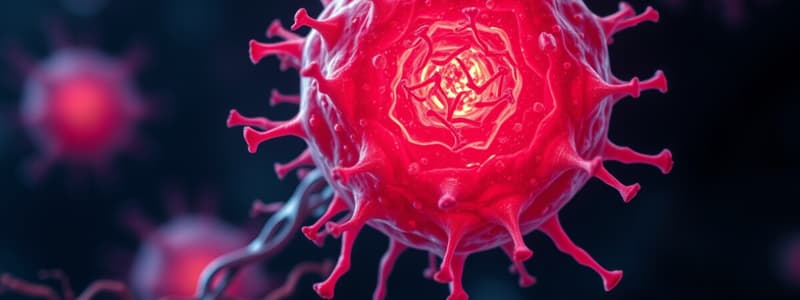Podcast
Questions and Answers
What is the definition of apoptosis?
What is the definition of apoptosis?
Apoptosis is programmed (genetically regulated) cell death that eliminates cells that are no longer needed or dangerous cells.
What is the function of apoptosis?
What is the function of apoptosis?
To sculpt body structures, eliminate unnecessary tissues, maintain balance between cell division and cell death, and roles in aging and diseases.
What is the difference between apoptosis and necrosis?
What is the difference between apoptosis and necrosis?
Apoptosis is programmed cell death that occurs neatly; necrosis is death by injury leading to inflammation and damage to neighboring cells.
Which change happens in the plasma membrane of an apoptotic cell?
Which change happens in the plasma membrane of an apoptotic cell?
What happens to cytochrome c in an apoptotic cell?
What happens to cytochrome c in an apoptotic cell?
Which techniques are used to detect apoptosis?
Which techniques are used to detect apoptosis?
What is a caspase?
What is a caspase?
Describe the extrinsic pathway to caspase activation.
Describe the extrinsic pathway to caspase activation.
Describe the intrinsic pathway to caspase activation.
Describe the intrinsic pathway to caspase activation.
What are the 3 different classes of Bcl2 regulators?
What are the 3 different classes of Bcl2 regulators?
What can be defined as pro-apoptotic stimuli?
What can be defined as pro-apoptotic stimuli?
What is the function of survival factors?
What is the function of survival factors?
What is the function of mitogens?
What is the function of mitogens?
What is the function of growth factors?
What is the function of growth factors?
What may happen if cells fail to undergo apoptosis?
What may happen if cells fail to undergo apoptosis?
What happens if an oncogene is lost or if it's overactive?
What happens if an oncogene is lost or if it's overactive?
Flashcards are hidden until you start studying
Study Notes
Apoptosis Overview
- Apoptosis is programmed cell death that selectively eliminates unneeded or harmful cells.
Functions of Apoptosis
- Crucial for sculpting body structures, such as neural wiring and limb development.
- Eliminates unnecessary tissues, e.g., a tadpole’s tail.
- Maintains tissue homeostasis by balancing cell division and death.
- Plays a role in aging and various diseases.
Comparison: Apoptosis vs. Necrosis
- Apoptosis is a controlled, physiological process of cell death, where cells shrink and are cleared without harming others.
- Necrosis involves pathological cell death, where cells swell and rupture, causing inflammation and damage to surrounding cells.
Plasma Membrane Changes
- During apoptosis, phosphatidylserine shifts from the inner to the outer plasma membrane leaflet, signaling phagocytes to clear the cell.
Cytochrome c in Apoptosis
- Cytochrome c is released from mitochondria to the cytosol during apoptosis, an important step in the apoptotic process.
Detection Techniques for Apoptosis
- DNA laddering: visualizes DNA fragmentation indicating cell death.
- TUNEL staining: labels fragmented DNA with fluorescent markers.
- Detection of cytochrome c in the cytosol signifies apoptotic activity.
Caspases
- Caspases are cysteine-dependent proteases central to apoptosis.
- Initiate and amplify the apoptotic process through a caspase cascade.
Extrinsic Pathway of Caspase Activation
- Triggered by Fas receptor activation on the cell's surface.
- Interaction with lymphocyte fas ligand initiates the caspase signaling cascade.
Intrinsic Pathway of Caspase Activation
- Involves the release of cytochrome c from mitochondria.
- Cytochrome c forms an apoptosome with adaptor proteins, activating procaspase-9 leading to apoptosis.
Bcl2 Family of Regulators
- Consists of anti-apoptotic (Bcl-2), pro-apoptotic (Bax, Bak, Bad), and BH3-only proteins.
- The balance of these proteins decides cell survival or death.
Pro-apoptotic Stimuli
- Increased oxidative stress.
- DNA damage from UV or X-ray exposure.
- Chemotherapeutic drug effects.
- Accumulation of misfolded proteins.
- Exposure to death activators like Fas.
- Withdrawal of growth and survival signals.
Role of Survival Factors
- Suppress apoptosis by modulating Bcl2-family proteins, promoting cell survival.
Function of Mitogens
- Stimulate cell division by inhibiting the activity of the retinoblastoma protein via cyclin-dependent kinases (CDKs).
Function of Growth Factors
- Promote cell growth by increasing cell size and mass.
Consequences of Failed Apoptosis
- Can lead to uncontrolled cell growth and the development of cancer.
Oncogenes
- Oncogenes normally promote cellular growth and survival.
- Loss of an oncogene reduces growth; overactivity may push towards cancerous growth.
Tumor Suppressor Genes
- Typically inhibit excessive cell growth.
- Loss of function can lead to unregulated cell proliferation, potentially resulting in cancer.
Studying That Suits You
Use AI to generate personalized quizzes and flashcards to suit your learning preferences.




